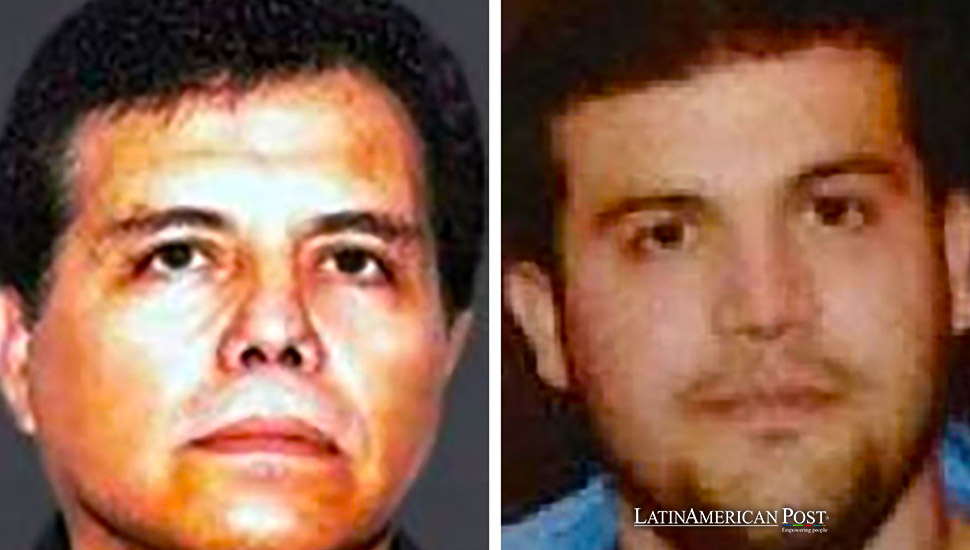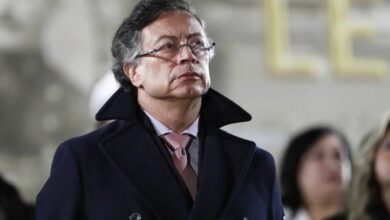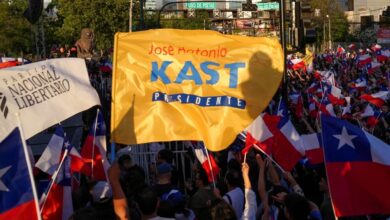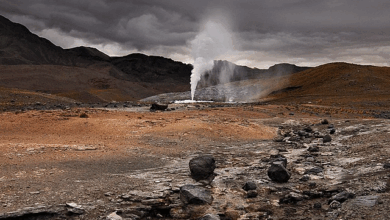Dramatic Betrayal Leads to the Capture of Two Major Mexican Drug Lords

The unforeseen turn of events, where Ismael “El Mayo” Zambada was betrayed by Joaquin Guzman Lopez, resulting in their capture in El Paso, sent shockwaves through the drug trafficking world. This revelation exposed a labyrinth of strategic negotiations, adding a layer of complexity to the already intricate web of drug cartel operations.
Ismael’ El Mayo’ Zambada is one of the most notorious names in drug war history, synonymous with the fearsome power and corrosive influence of the most critical drug cartel in the world. The last of an original generation of drug cartel leaders, he created the Sinaloa Cartel alongside Joaquin’ El Chapo’ Guzman from the remnants of the Guadalajara Cartel after it collapsed in 1989. But unlike his infamous partner, who was twice jailed and escaped, El Mayo was able to evade capture for some 35 years until now.
U.S. authorities arrested him in El Paso, Texas, on Thursday. He has already pleaded not guilty to multiple charges in federal court in Texas. He was lured to the U.S. as part of an elaborate sting operation masterminded by the son of his former partner, El Chapo. Joaquin Guzman Lopez, one of the heirs to El Chapo’s operation, was arrested alongside Zambada, who had led him to believe he was traveling to northern Mexico to look at prospective properties for clandestine airstrips.
“Are you worried about being captured?” Zambada was asked in 2010 by the late Mexican journalist Julio Scherer García, who had traveled deep into the mountains for an unprecedented interview with the drug lord. “The idea of being jailed gives me panic,” he answered. “I’m not sure I have what it takes to kill myself. I want to think I do and that I’d take my own life.” However, he didn’t have the means or the opportunity for it. For someone who exercised such caution over so many years, it seems extraordinary that Zambada was duped at 76. Perhaps it would always take something unique to see him in custody.
A Historic Operation
The plane’s journey began with Guzman Lopez, son of the incarcerated cartel leader, planning to surrender to U.S. authorities. However, his companion, the legendary trafficker Zambada, was unaware of this plan. Guzman Lopez had deceived him into boarding the plane under the pretext of inspecting real estate in northern Mexico. This unexpected move took aback current and former U.S. officials, as they had lost hope in Guzman Lopez’s surrender. The subsequent arrest of Zambada, who had evaded capture for decades, marks a significant victory for U.S. law enforcement.
The Federal Bureau of Investigation (FBI) and Homeland Security Investigations (HSI) executed the operation. Agents scrambled from their El Paso offices to intercept the plane just in time to make the arrest. The apprehension of Zambada, a septuagenarian in a wheelchair, highlights the lengths to which Guzman Lopez went to facilitate his surrender and possibly secure a favorable plea bargain.
Betrayal and Its Consequences
The betrayal of Zambada by Guzman Lopez, who is about 38 years old, has created a rift within the Sinaloa Cartel. This development could trigger violent conflicts between the factions controlled by the Guzman and Zambada families. Zambada, co-founder of the Sinaloa Cartel with El Chapo, is regarded as one of the most influential traffickers in Mexican history. The reasons behind Guzman Lopez’s betrayal remain unclear. Still, it is speculated that he sought a more favorable plea deal and the opportunity to assist his brother Ovidio, who was extradited to the U.S. in 2023.
The back-channel negotiations between U.S. authorities and Guzman Lopez were conducted through lawyers. Jeffrey Lichtman, the attorney representing the Guzman brothers, declined to comment on the situation. Zambada pleaded not guilty to charges of drug trafficking, criminal enterprise, and money laundering in a Texas courtroom, with his lawyer arguing that he was forcibly kidnapped and brought to the U.S. against his will.
Sinaloa Cartel’s Shift in Power Dynamics
The arrest of Zambada and Guzman Lopez’s involvement in the operation has significant implications for the Sinaloa Cartel. The cartel has been under intense pressure from U.S. authorities, mainly due to its role in trafficking fentanyl, a synthetic opioid responsible for a surge in overdose deaths in the United States. The U.S. government has made it a priority to capture and prosecute high-ranking cartel members, often striking plea deals in exchange for information leading to further arrests.
El Chapo’s sons, known as Los Chapitos, have been primary targets for U.S. law enforcement. The brothers, particularly Joaquin and Ovidio, have faced relentless pursuit due to their involvement in the cartel’s operations. Fentanyl, a highly potent and deadly drug, has become a significant focus of U.S. anti-narcotics efforts, contributing to the capture of crucial Sinaloa Cartel figures. The arrests of Zambada and Guzman Lopez are not just substantial. They are monumental, marking a turning point in the fight against drug trafficking. President Joe Biden praised the arrests and reaffirmed his commitment to combating the fentanyl epidemic.
The New Generation of Drug Lords
El Chapo’s sons are notorious for their violent and aggressive tactics, contrasting with Zambada’s more calculated and discreet approach. Although less prominent than his brothers, Joaquin Guzman Lopez played a crucial role in the recent events. The U.S. government had placed substantial bounties on both Zambada and Guzman Lopez, underscoring their significance in the drug trafficking hierarchy.
Despite the success of this operation, many questions still need to be answered. How did a seasoned and cautious operator like Zambada end up on the plane? The involvement of the U.S. authorities in securing these arrests without the direct participation of Mexican officials highlights the complexities of international law enforcement collaborations. Mexican Security Minister Rosa Rodriguez confirmed that the U.S. informed Mexico of the detentions but clarified that Mexican authorities did not partake in the operation.
Outgoing Mexican President Andres Manuel Lopez Obrador has adopted a cautious approach in dealing with powerful cartels, often curbing security cooperation with the U.S. to avoid exacerbating violence. The previous strategy of targeting cartel kingpins, known as the kingpin strategy, had led to widespread violence and instability. The recent events reflect the ongoing, tense struggle between effective law enforcement and the unintended consequences of disrupting cartel leadership.
In 2019, Mexico’s military faced significant challenges when they arrested Ovidio Guzman, only to release him after cartel members launched a violent siege in Culiacan. This incident highlighted the cartel’s power and the risks associated with high-profile arrests. Ovidio was eventually recaptured and extradited to the U.S., showcasing the relentless efforts of U.S. authorities to dismantle the cartel’s operations.
Future Implications
The capture of Zambada and Guzman Lopez underscores the evolving dynamics within the Sinaloa Cartel. As younger traffickers recognize the benefits of surrendering and negotiating plea deals, the traditional methods of cartel operation may shift. The willingness of some traffickers to cooperate with authorities in exchange for reduced sentences and entry into witness protection programs indicates a changing landscape in the world of drug trafficking.
The involvement of Guzman Lopez in betraying his father’s long-time partner raises questions about loyalty and survival within the cartel. As the U.S. continues to target key figures, the internal power struggles within the Sinaloa Cartel are likely to intensify. Law enforcement agencies and analysts will closely watch the ramifications of these events, as they may signal a new phase in the battle against drug trafficking.
The impact of these arrests extends beyond the U.S. and Mexico, affecting the broader Latin American region. Drug trafficking has long been a pervasive issue, with cartels operating across borders and influencing political and social dynamics. The capture of high-profile figures like Zambada and Guzman Lopez sends a strong message to other traffickers in the region. It demonstrates the reach and determination of U.S. law enforcement and the potential consequences of continued involvement in drug trafficking.
Latin American countries have been grappling with the challenges posed by powerful cartels for decades. The influence of these criminal organizations on local economies, governance, and public safety is profound. Efforts to combat drug trafficking often involve complex and sometimes controversial measures, including extradition agreements, joint operations, and intelligence sharing.
The recent arrests highlight the importance of international cooperation in addressing the drug trade. While Mexico and the U.S. have historically collaborated on such matters, the current political climate and strategic considerations complicate these efforts. The broader Latin American community will closely observe how these events unfold and the implications for regional security and stability.
A Fractured Alliance
The capture of Ismael “El Mayo” Zambada and Joaquin Guzman Lopez marks a significant milestone in the fight against drug trafficking. The operation, filled with betrayal and strategic negotiation elements, underscores the complexities of dismantling influential criminal organizations. As the Sinaloa Cartel faces internal turmoil and external pressures, the future of its operations remains uncertain.
For Latin America, these events serve as a reminder of the ongoing challenges posed by drug trafficking and the need for continued vigilance and cooperation. The battle against powerful cartels is far from over, and the outcomes of such high-profile arrests will shape the strategies and policies of law enforcement agencies in the years to come. The arrest of these two prominent figures is a testament to the relentless pursuit of justice and the commitment to curbing the influence of drug trafficking on both sides of the border.
Also read: Cartel Monster Trucks and Mexico’s Battle Against Armored Warfare
Zambada’s fall from power is a testament to the volatility within the upper echelons of the Sinaloa Cartel. The betrayal orchestrated by Guzman Lopez illustrates a significant shift in the cartel’s internal dynamics. This rift is a personal betrayal and a strategic move that could alter the cartel’s power structure.





